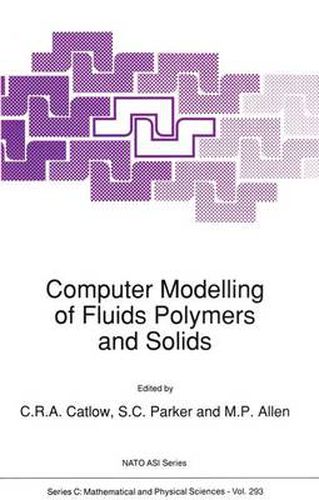Readings Newsletter
Become a Readings Member to make your shopping experience even easier.
Sign in or sign up for free!
You’re not far away from qualifying for FREE standard shipping within Australia
You’ve qualified for FREE standard shipping within Australia
The cart is loading…






This title is printed to order. This book may have been self-published. If so, we cannot guarantee the quality of the content. In the main most books will have gone through the editing process however some may not. We therefore suggest that you be aware of this before ordering this book. If in doubt check either the author or publisher’s details as we are unable to accept any returns unless they are faulty. Please contact us if you have any questions.
Computer Modelling techniques have developed very rapidly during the last decade, and interact with many contemporary scientific disciplines. One of the areas of greatest activity has concerned the modelling of condensed phases, including liquids solids and amorphous systems, where simulations have been used to provide insight into basic physical processes and in more recent years to make reliable predictions of the properties of the systems simulated. Indeed the predictive role of simulations is increasingly recognised both in academic and industrial contexts. Current active areas of application include topics as diverse as the viscosity of liquids, the conformation of proteins, the behaviour of hydrogen in metals, the diffusion of molecules in porous catalysts and the properties of micelles. This book, which is based on a NATO ASI held at the University of Bath, UK, from September 5th-17th, 1988, aims to give a general survey of this field, with detailed discussions both of methodologies and of applications. The earlier chapters of the book are devoted mainly to techniques and the later ones to recent simulation studies of fluids, polymers (including biological molecules) and solids. Special attention is paid to the role of interatomic potentials which are the fundamental physical input to simulations. In addition, developments in computer hardware are considered in depth, owing to the crucial role which such developments are playing in the expansion of the horizons of computer modelling studies.
$9.00 standard shipping within Australia
FREE standard shipping within Australia for orders over $100.00
Express & International shipping calculated at checkout
Stock availability can be subject to change without notice. We recommend calling the shop or contacting our online team to check availability of low stock items. Please see our Shopping Online page for more details.
This title is printed to order. This book may have been self-published. If so, we cannot guarantee the quality of the content. In the main most books will have gone through the editing process however some may not. We therefore suggest that you be aware of this before ordering this book. If in doubt check either the author or publisher’s details as we are unable to accept any returns unless they are faulty. Please contact us if you have any questions.
Computer Modelling techniques have developed very rapidly during the last decade, and interact with many contemporary scientific disciplines. One of the areas of greatest activity has concerned the modelling of condensed phases, including liquids solids and amorphous systems, where simulations have been used to provide insight into basic physical processes and in more recent years to make reliable predictions of the properties of the systems simulated. Indeed the predictive role of simulations is increasingly recognised both in academic and industrial contexts. Current active areas of application include topics as diverse as the viscosity of liquids, the conformation of proteins, the behaviour of hydrogen in metals, the diffusion of molecules in porous catalysts and the properties of micelles. This book, which is based on a NATO ASI held at the University of Bath, UK, from September 5th-17th, 1988, aims to give a general survey of this field, with detailed discussions both of methodologies and of applications. The earlier chapters of the book are devoted mainly to techniques and the later ones to recent simulation studies of fluids, polymers (including biological molecules) and solids. Special attention is paid to the role of interatomic potentials which are the fundamental physical input to simulations. In addition, developments in computer hardware are considered in depth, owing to the crucial role which such developments are playing in the expansion of the horizons of computer modelling studies.